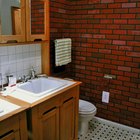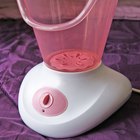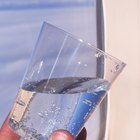
Roughly 20 percent of the average monthly utility bill goes toward powering home appliances, according to the U.S. Department of Energy. To keep your refrigerator, oven, microwave, and other appliances running for less, consider switching to solar power. It can help the environment and lower your bills. While traditional power generation produces greenhouse gases that can lead to global warming, solar power relies on heat and light from the sun, and produces no harmful emissions.
Solar Hot Water Heater
Solar hot-water heaters are becoming popular appliances. A set of photovoltaic panels captures heat energy from the sun to heat water for bathing, washing dishes, and other household uses. The units can be direct or indirect. A direct water heater passes heat energy directly into an insulated water tank, where it is then pumped throughout the home. Indirect systems use a series of refrigerant-filled tubes to transfer heat energy into the home, where it is then used to heat the water. Direct systems work best in areas that rarely experience freezing temperatures, while indirect systems can be used in almost any type of climate.
According to the American Council for an Energy Efficient Economy, solar hot-water heaters cost about $175 a year to run, compared to $350 for a traditional gas-fired storage water heater. Best of all, solar systems generally feature an electric backup that operates if solar power is interrupted or insufficient.
Photovoltaic Panels
Traditional solar panels could be used to provide heat to the home, but were not designed to power appliances. Modern photovoltaic panels use a slightly different method of collecting solar energy, and can produce enough electricity to power every appliance in the average home. Homeowners install these panels on roof or ground racks, where they collect solar energy whenever the sun is shining. This energy passes through a series of wires into a transformer, where it is converted into the standard 110 volts used in the home. Excess energy is stored outdoors in a battery backup, which provides power even when the sun isn't shining.
Installers can help you choose the correct quantity and type of photovoltaic panels based on the electrical demands of your home. If you have limited space available, you can use smaller panels to power individual appliances through a dedicated circuit.
Solar Ovens
A solar oven is a cooking appliance that runs entirely on solar energy. It contains mini-solar or photovoltaic panels to collect and absorb heat energy from the sun. Using this heat, the oven can cook almost any type of food. Solar ovens provide a slow-cooking process similar to a Crock pot, and can only be used outdoors. Using an optional reflector, users can increase the temperature of these ovens up to 400 degrees, which means that cooking can be completed much more quickly.
Tax Credits
Photovoltaic panels and solar-powered appliances are often associated with high upfront costs. While these items may be fairly expensive, buyers will find numerous tax rebates and incentives to offset these costs. The federal government offers tax credits up to $1,500 on energy-efficient appliances, as well as additional incentives for solar or photovoltaic panels. Many states also have rebate programs in place to make energy-efficient appliances more affordable. Visit the links in the Resources section to see if you qualify for these programs.
Related Articles

How a European Washer & Dryer Work

4 Different Ways to Use Water Wisely at ...

List of Ways to Conserve Mother Nature

The Disadvantages of Passive Solar ...

Kinetic Watches Vs. Eco-Drive Watches

How Do Citizen Eco-Drive Watches Work?

How to Build Your Own Mobile Kitchens

Handicapped Bathroom Grants for Veterans

Alternate Ways to Divert Roof Rain Water

Examples of Green Products

How to Conserve Natural Gases

How to Use the Facial Sauna

Cooking With Glass Vs. Ceramic

Uses of Macadamia Nut Shells

Casio G-Shock Atomic Time Set ...

How a European Washer & Dryer Work

Reverse Osmosis Purifier Vs. Ionization

Solar Cooker Facts

Instructions for the Casio WVA-105H

The Difference Between a Chafing Dish & ...
References
Resources
Writer Bio
Emily Beach works in the commercial construction industry in Maryland. She received her LEED accreditation from the U.S. Green Building Council in 2008 and is in the process of working towards an Architectural Hardware Consultant certification from the Door and Hardware Institute. She received a bachelor's degree in economics and management from Goucher College in Towson, Maryland.
Photo Credits
Solar image by Thomas Leiss from Fotolia.com